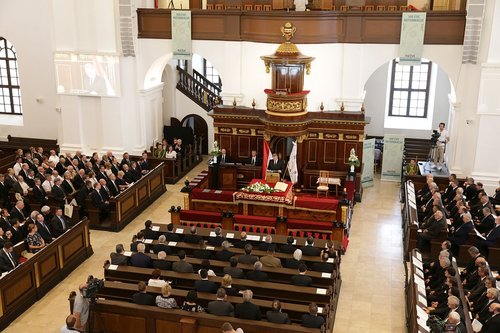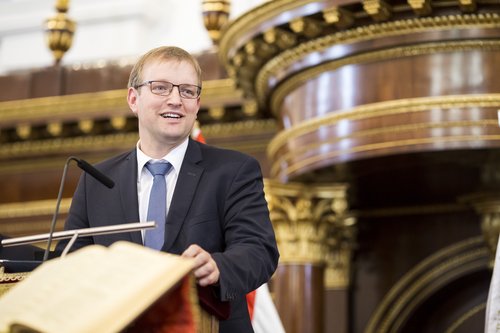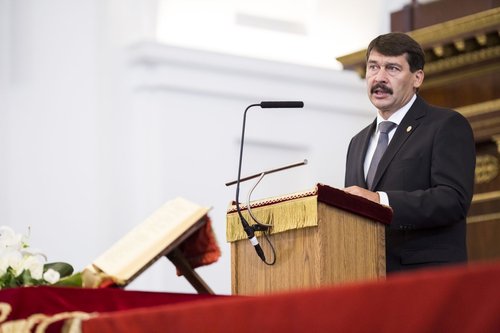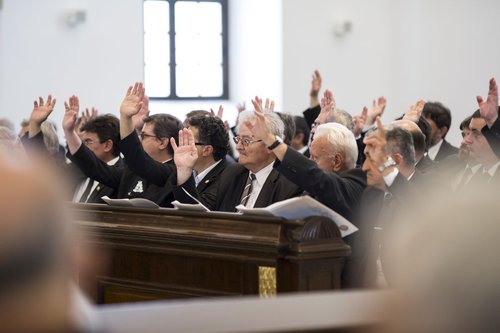Celebration and Recommitment
2017. június 27., keddThe Common Synod of the Hungarian Reformed Church (HRC) took place in Debrecen on 24 June, 2017. This year is one of great celebrations for our church as it marks the 450th anniversary of the establishment of the HRC and the occasion of the adoption of a new translation of the Second Helvetic Confession.
The Common Synod of the Hungarian Reformed Church (HRC) recently took place in Debrecen, Hungary on 24 June, 2017 and was a day full of celebration and fellowship for all in attendance.

The HRC is an expression of a special church communion in the form of a Common Synod that is composed of the Hungarian-speaking reformed churches in the Carpathian Basin. 2017 marks the 450-year anniversary of the 1567 Constitutional Synod that created the Hungarian Reformed Community in the Carpathian Basin. In celebration of this, the RCH held a celebratory synod meeting, remembering the creation of the HRC as well as approving a new translation of the Second Helvetic Confession, signed first by the Swiss reformed cantons in 1566. This new translation will use more modern vernacular and appeal to a wider base of believers, spreading the influence of the important Confession throughout the region. During its session the Common Synod accepted a festive statement on recommitting itself to the values of the Second Helvetic Confession.
The strengthening of Reformation in Debrecen dates back to the 1550s and ’60s, with such leading figures as Márton Sánta Kálmáncsehi and Péter Juhász Melius. The 1567 synod of Debrecen played a crucial role in the stabilization of the Reformed Church. The representatives of the dioceses rejected the teachings of Antitrinitarianism in two confessions written in Latin and Hungarian, endorsed the Second Helvetic Confession, and laid down the basic rules, principles and regulations of the new church.
The HRC Common Synod began with a Celebratory Session on the morning of 24 June, 2017. The gathering focused on the Second Helvetic Confession and approving its new Hungarian translation, and exciting step to making the confession more readily accessible to the average Hungarian. The session also remembered the 450th anniversary of the acceptance of this confession. In addition, the Synod approved the official Association of the Hungarian Speaking Reformed Communities in Canada and the Hungarian Speaking Reformed Congregation in Luxemburg to the HRC.
Martin Engels, Moderator of the Reformed Alliance in Germany (RAG), was also in attendance for the Synod meeting and extended sincere greetings from the RAG and its member churches. “The Church of Jesus Christ is a community whose members are in deep connection beyond their own respective local and regional boundaries and characteristics,” said Engles in his address. “In my opinion, it is very exciting to look at the topic of your Synod,” he continued, “450 years of Hungarian Reformed community, an event that is inseparably connected with the translation of the Second Helvetic Confession. Exciting, because the circumstances of its birth and also its impact are remarkably Ecumenical. Martin Engles noted that it was amazing that in the end this confesion had significantly less impact in Germany than in Switzerland or in Hungary.

Engles closed his address with timely words about the current European context, saying that, “We celebrate reformation Jubilee in Germany and across Europe. It is good to deal with its own history and to celebrate this. But still: We are challenged to bear witness to what we stand for, both in action and reflection. Are we able to identify the real issues behind the themes that are hiding behind some aggressive political rhetoric in Europe? In other words: are we are alert enough to recognize that "here" and "now" really?” He noted that it is easy for the church to feel overwhelmed and alone in it’s own context, and so, in his eyes, “we need the conversation with each other, to enlighten the blind spots in the perception of reality. The exchange between the churches and the communities sharpen our senses for the analysis of the present reality and a theological reflection, which opens up new horizons.” In this way, the upcoming General Assembly of WCRC in Leipzig, Germany, with its theme of "Living God, renew and transform us,” is an important reminder of the deepest reality and truth of the Reformation: “God is the subject of our confession, our Church and our faith.”
A festive reception followed the Session meeting in which President János Áder addressed the crowd.

The Reformation has not only become a part of Hungarians’ lives over the past centuries but also a support for their shared national identity, President János Áder said at a festive session of the synod of the Hungarian Reformed Church in Debrecen, in eastern Hungary, on Saturday. Áder named the Hungarian language Bible as the “greatest gift” of the Reformation for Hungary. The president noted that the Reformation had divided Europe and that “the freedom fight of faith” had resulted in heavy casualties across the continent. He said that in Hungary, the Reformation had coincided with “the freedom fights of the nation.” Áder said the strengthened faith of believers brought about by the Reformation had tightened the community of the church and, in turn, the community of the nation. Hungary’s ongoing memorial year marking the 500th anniversary of the Reformation in Europe includes close to 400 events in the Carpathian Basin. Source: MTI. Posted by Alexandra Béni on dailynewshungary.com
In the afternoon, those in attendance gathered for a celebratory worship service where Bishop Izdebski participated in the liturgy on behalf of the Reformed Church in Poland.
The whole event was a great celebration for Hungarian Reformed Church as it marked the 450th anniversary of the establishment of the HRC and the occasion of the adoption of a new translation of the Second Helvetic Confession. The Synod committed itself to shape the life of its congregations and institutions according to the confession and it recognized with repentance and self-examination all expressions of the life and teaching of the church which hindered the fulfillment of its mission in the past or endangers the purity of the testimony of the Gospel and credibility of its service in the present. The Synod also expressed its willingness to learn from contemporary confessions of the worldwide church, in the spirit of mutual appreciation, fraternal dialogue, and understanding.

“We give thanks to God for the generations before us, whom He inspired by His Spirit again and again to shape their life and carry out its mission according to the biblical insights and teaching of our confessions. 450 years ago, in the midst of serious debates, the leaders and governing bodies of our reformed church “renewed according to the Gospel” and accepted the Second Helvetic Confession, because they were working with full commitment to renew the life and mission of the church according to God’s will and cleanse it from false doctrines to preserve its unity given in Christ and witness all this to everyone. Following the example of many European churches of the time, by this decision, the Synod of Debrecen wished to provide assistance and orientation on the reformed Christian faith, life, teaching, and service. Today, the Common Synod of the Hungarian Reformed Church, still embracing the consideration of its forefathers, re-affirmed the Second Helvetic Confession.”-quote from the Statement of the HRC Common Synod
Article by Kearstin Bailey
Via dailynewshungary.com
Photos by reformatus.hu
Contact us
Click here if you are interested in twinning.
Reformed Church in Hungary
Address: H-1146 Budapest, Abonyi utca 21.
PO Box: 1140 Budapest 70, Pf. 5
Email: oikumene@reformatus.hu
English, German and Korean language services in Budapest
Links
Recommended articles
-
Pastoral Letter in the Light of the Pandemic
Bishop Dr. István Szabó sent a pastoral letter of encouragement to the ministers serving in RCH’s congregations, expressing his gratitude for the persistence and creativity of the pastors.
-
RCH Joins in Pope's Call for Prayer
RCH published the call on congregations to join the initiative of Pope Francis, supported by ecumenical organisations, to unite in praying the Lord’s Prayer on Wednesday, 25 March, at noon.
-
English Speaking Worship Services Online
Each Sunday at 11 AM (CET) the St. Columba's Church of Scotland in Budapest, the international community of RCH invites you to join the worpship service on its facebook page.
-
Test of Humanity and Companionship
Reformatus.hu asked Dr. György Velkey, Director General of the Bethesda Children’s Hospital of RCH about the challenges of health care workers and ways of prevention against the pandemic.
-
All Church Events Suspended
In light of the coronavirus the Presidium of RCH requested congregations to suspend all church events with immediate effect. Beside restrictions, it calls for prayer, sobriety and responsibility.











